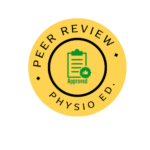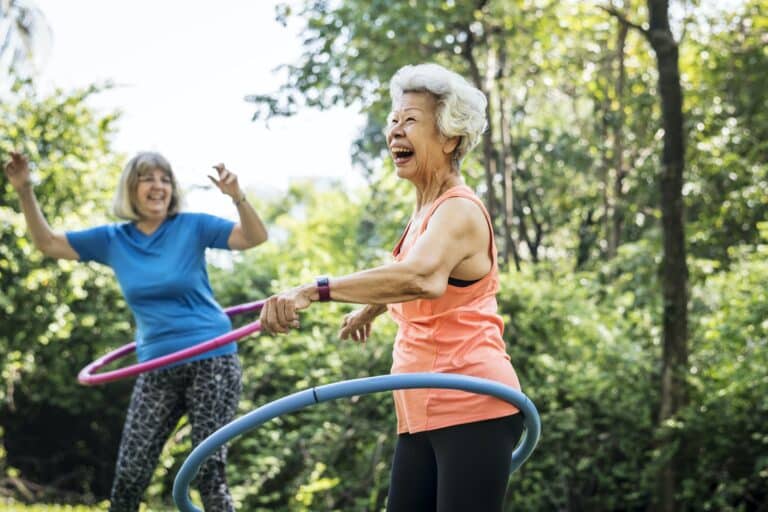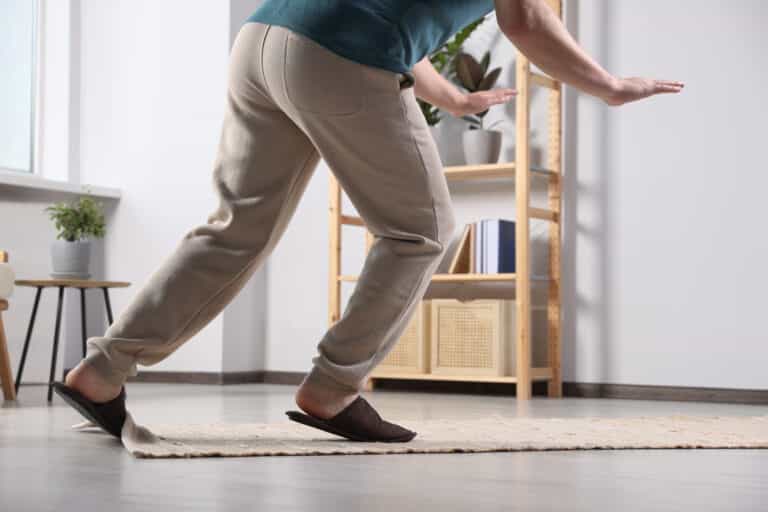As a trainer and health educator, I’ve witnessed the transformative power of a well-structured morning routine for active adults. In this article, I’ll highlight the research-based benefits of developing a healthy morning routine.
The focus here isn’t on dramatic changes to your daily routine. Instead, I’ll concentrate on minor, manageable adjustments that can significantly impact your health. I’ll discuss various activities, from the ideal breakfast to fuel your day to exercises designed to help maintain your agility and strength.
I’ll provide handy, implementable tips to help you integrate these habits into your everyday life. So, let’s explore how to kickstart your day with healthy habits.
The Importance of Hydration in the Morning
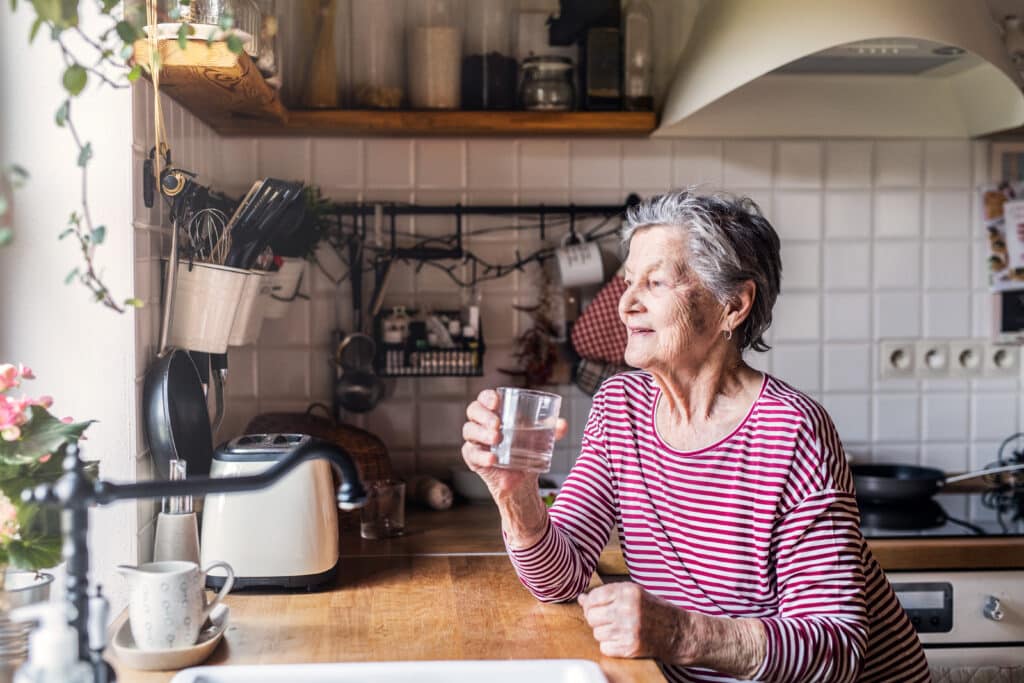
Hydration plays a pivotal role in our health, especially as we age. Water drives essential bodily functions such as nutrient absorption, digestion, and temperature regulation.
Recent findings have highlighted the severe implications of dehydration on our health. For instance, a study published in the European Journal of Nutrition (2018) discovered a significant connection between dehydration and cognitive function decline in active older adults.
The research indicated dehydrated participants scored lower on cognitive tests than adequately hydrated participants. Additionally, dehydration can lead to fatigue, kidney problems, and other health complications.
The good news is that maintaining proper hydration can be easy. Starting your day with a glass of water is a simple but effective routine. This habit rehydrates your body after a good night’s sleep and kickstarts your metabolism for the day ahead.
Common Dehydration Symptoms
It’s also critical to be aware of dehydration symptoms. These can include feelings of thirst, a dry or sticky mouth, decreased urination, or dark yellow urine. If you experience these symptoms, your body likely requires more water.
However, thirst is a late indicator of dehydration. This means that if you’re thirsty, you should drink some water as soon as possible to prevent undesirable effects like headaches, grogginess, or lightheadedness.
Your urine color can provide a good guide to determine your hydration level. Clear or almost clear urine indicates proper hydration, so if your urine is darker, have a glass of water.
How to Boost Daily Water Consumption
Consider carrying a water bottle with you throughout the day or setting reminders on your phone to drink water. Additionally, you can obtain water from your foods, especially fruits and vegetables, which naturally have high water content.
I want to stress the vital importance of hydration in maintaining overall health, particularly for active seniors. By ensuring proper hydration, you’re giving your body the necessary support to function at its best.
Keep in mind hydration is just one aspect of the health equation. Regular exercise, a balanced diet, and mental health care are crucial to healthy aging.
Get Moving with Morning Exercise
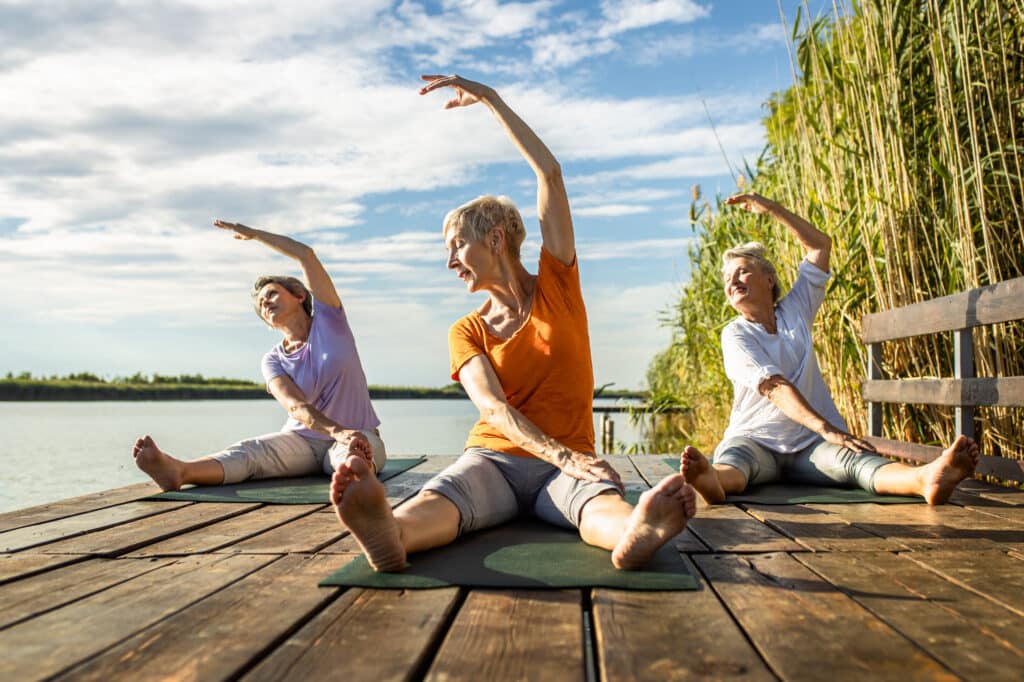
Active aging emphasizes the importance of maintaining mobility, flexibility, and overall health as we age. Incorporating regular light exercise into your routine is an effective strategy, particularly in the morning.
Exercising in the morning allows your body to get moving early, loosening up muscles that have been dormant all night, boosting blood flow and heart rate, and getting your metabolic fire burning.
A wealth of scientific research supports the benefits of morning exercise for active seniors. Light morning activities, such as tai chi, stretching, and walking, can significantly improve balance, flexibility, and strength.
But not all exercise is created equal. Finding the right exercise to fit your needs is the key to success.
Selecting Safe Morning Exercises for Active Seniors
Finding safe, enjoyable, and beneficial activities for your needs is vital. For instance, qi gong is a low-impact exercise that enhances balance and helps reduce the risk of falls, a prevalent issue among active seniors.
Stretching is another excellent option, as it can increase flexibility and mobility, which are crucial for maintaining an active lifestyle.
On the other hand, a morning walk is a straightforward yet effective form of exercise that can boost cardiovascular health, thereby improving heart function and circulation.
Consistency Over Intensity
The key to reaping the benefits of exercise is consistency, not intensity. Even a few minutes of exercise each morning can significantly impact your health and well-being.
A common mistake many people make is jumping into exercise in a way that’s too intense for what their body can handle. Whether you have a history as an athlete or are brand new to exercise, starting slow and gradually increasing intensity over weeks and months will keep you moving safely with better results.
Choose a type of exercise you can grow into and build on that foundation. Remember, optimal health is a marathon, not a sprint.
Incorporating Activity into Your Routine
It’s hard to overstate the importance of regular physical activity for older adults. Walking, swimming, or gentle yoga can be excellent options for maintaining physical health. Consistent exercise helps maintain strength, flexibility, and balance, reducing the risk of falls and injuries.
But what if you don’t have time to go to the pool or yoga studio?
Although swimming or yoga are definitely effective, daily activities like gardening or household chores burn calories and can even boost cardiovascular health if you do them just a little bit faster than normal.
Alternatively, taking the stairs at work or parking in the farthest parking space in the grocery store parking lot are sneaky ways to get more movement in your daily life. Think about these as frequent bite-sized movement opportunities built into your day-to-day activities.
Remember, the aim is not to engage in intense workouts but to maintain a consistent moderate activity level. However, I should note that it’s best to consult your healthcare provider before embarking on a new exercise regimen.
The Importance of a Nutritious Breakfast: Energizing Your Day
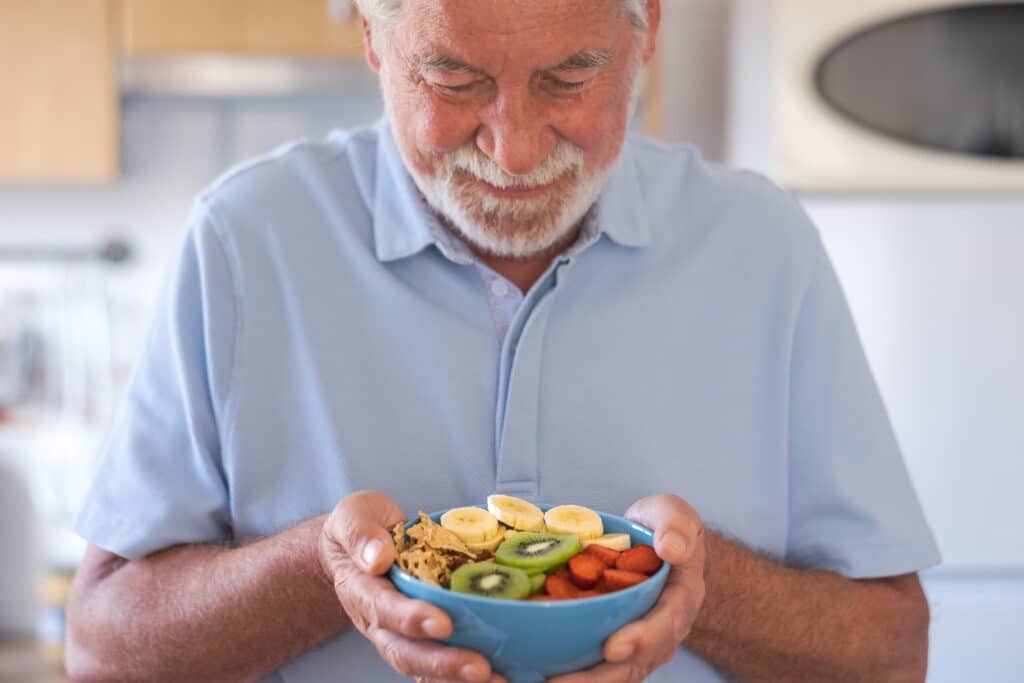
A balanced breakfast jump-starts your metabolism and provides the energy required to stay active throughout the day. Skipping this meal could result in a noticeable energy decrease, potentially impacting your daily activities and, over time, your overall health.
A nutritious breakfast can also combat feelings of fatigue, enabling you to maximize your day. This becomes increasingly vital as we age, with the maintenance of physical health taking on greater importance for overall well-being.
Tips for Choosing Healthier Breakfast Options
The food choices you make for breakfast can significantly impact your health. For example, beginning your day with whole grains, fruits, and protein can provide the essential nutrients to stay active. Here are a few breakfast suggestions that are both healthy and tasty:
- Whole grain toast topped with ripe avocado and a side of mixed berries.
- A warm bowl of oatmeal garnished with nuts, fresh fruit, and a side of low-fat yogurt with banana.
- A vegetable omelet served with a slice of whole-grain bread.
These are just a couple of examples that provide healthy protein, fats, carbohydrates, vitamins, and minerals to keep you energized. Choose enjoyable foods that are enjoyable and full of protein and fiber, and avoid added sugars when possible.
Remember, portion control is just as critical as the quality of the food. Even healthy foods can contribute to weight gain when consumed in large quantities.
Social Connection Habits for Healthier Aging

Engaging with friends, family, and community members can provide emotional support, help alleviate loneliness, and even boost cognitive function. It can be a potent component of your new morning routine!
A recent study observed that older adults who regularly engaged in social interactions exhibited less cognitive decline than those who were less socially active.
Nurturing social ties can significantly elevate your mental and emotional health. This could be through a weekly card game with friends, a daily phone call to a loved one, or active participation in community events.
However, scheduling time in your morning routine to interact or exercise with friends, call family members, or spend time at your favorite coffee shop can be beneficial to your mental health.
The Health Benefits of Social Engagement
The role of social engagement in promoting the mental health, cognitive function, and overall well-being of older adults has been consistently highlighted in scientific research.
For example, older adults who regularly engage in social interactions have significantly lower rates of depression and cognitive decline than those who live more isolated lives.4
This finding aligns with our understanding of humans as inherently social beings. As we all learned during the coronavirus pandemic, social interaction and feeling connected to others is an important and often overlooked aspect of our daily lives.
Furthermore, joining community groups or enrolling in classes designed for older adults can offer added benefits. These platforms provide ample opportunities for social interaction, continuous learning, and physical activity.
For instance, a morning yoga class for seniors can offer a gentle and safe way to stay physically active while providing a fun social outlet..
Harnessing Technology to Stay Connected
In the digital era, technology can be a valuable tool in helping older adults maintain their social connections. For example, video calls can help mitigate the physical distance when in-person visits are not possible.
Regular morning calls with family and friends provide a sense of routine and purpose, both particularly important for mental health.
Maintaining social ties and adhering to a regular routine can significantly improve the quality of life for seniors. It’s not just about staying busy; it’s about engaging in activities that stimulate the mind, foster emotional connections, and promote physical health.
Establishing a Healthy Routine
Consider starting your day with a morning routine that sets a positive tone for the rest of the day. This could involve light physical activity, such as a leisurely walk around your neighborhood. This gentle exercise can boost your energy levels and elevate your mood, preparing you for the day ahead.
Following this with a well-balanced breakfast ensures your body receives the necessary nutrients to stay active and energized throughout the day.
In addition to physical activity, you might consider incorporating regular mindfulness practice into your daily routine to reduce stress and promote relaxation. Spending a few minutes daily on focused breathing exercises or mindful observation can help reduce stress and promote overall well-being.
Consistency is key regardless of how you decide to meet your health and fitness goals. Establishing a daily routine will help you ingrain healthy habits you can develop over weeks and months, giving you something to look forward to each and every day.
Key Takeaways
- A structured morning routine is an opportunity for seniors to enhance their overall health and well-being.
- Hydration is crucial, particularly as we age, for nutrient absorption, digestion, and body temperature regulation.
- Dehydration has been linked to cognitive function decline in older adults.
- Physical activity, especially in the morning, promotes mobility, flexibility, and overall health.
- A nutritious breakfast fuels the body, jump-starts metabolism, and is linked to improved cognitive functions.
- Social connections have numerous health benefits, including reducing cognitive decline and depression rates.
- Modern technology can aid seniors in maintaining these essential social connections.
- Consistency in daily routines, encompassing hydration, exercise, nutrition, and social interaction, is vital for healthy aging.
References
- Bethancourt, H.J., Kenney, W.L., Almeida, D.M. et al. Cognitive performance in relation to hydration status and water intake among older adults, NHANES 2011–2014. Eur J Nutr 59, 3133–3148 (2020). https://doi.org/10.1007/s00394-019-02152-9.
- Kimiko Tomioka, Norio Kurumatani, Hiroshi Hosoi, Social Participation and Cognitive Decline Among Community-dwelling Older Adults: A Community-based Longitudinal Study, The Journals of Gerontology: Series B, Volume 73, Issue 5, July 2018, Pages 799–806, https://doi.org/10.1093/geronb/gbw059
- Dause TJ, Kirby ED. Aging gracefully: social engagement joins exercise and enrichment as a key lifestyle factor in resistance to age-related cognitive decline. Neural Regen Res. 2019 Jan;14(1):39-42. doi: 10.4103/1673-5374.243698. PMID: 30531067; PMCID: PMC6262997.
- Noguchi T, Saito M, Aida J, et al Association between social isolation and depression onset among older adults: a cross-national longitudinal study in England and Japan BMJ Open 2021;11:e045834. doi: 10.1136/bmjopen-2020-045834


